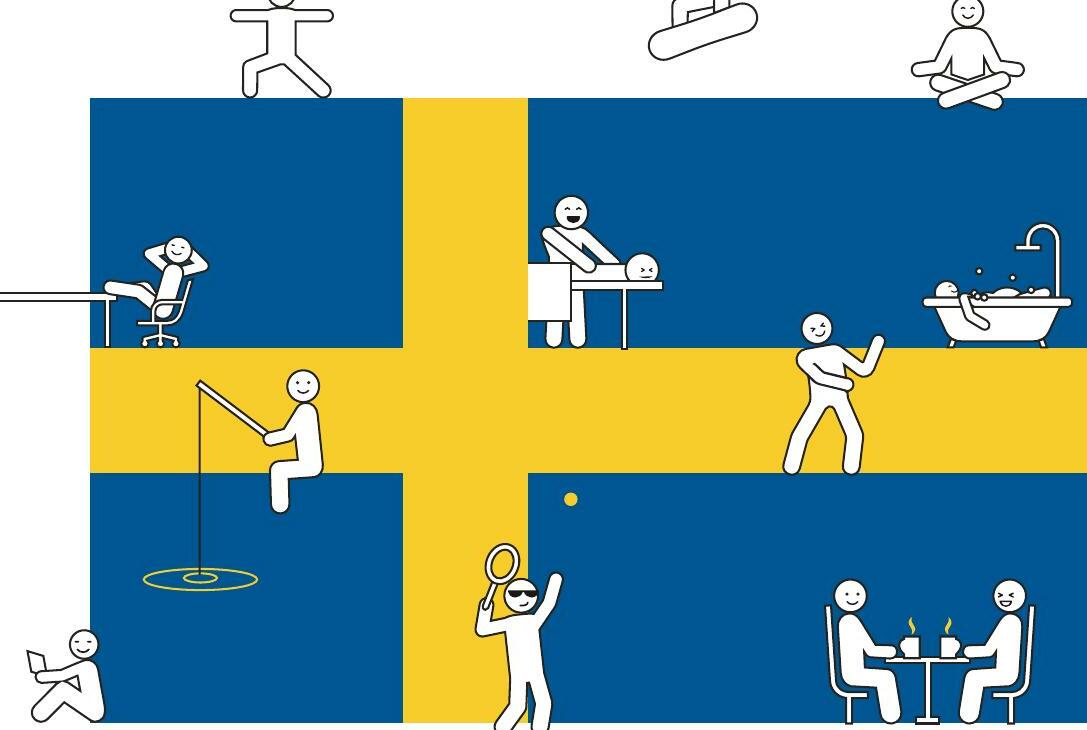
Gym classes, massages, mood boosting hobbies; it's no secret that staying "well" can be prohibitively expensive. But not necessarily in Sweden, where many employers offer their workers a "wellness allowance": up to 5,000 SEK ($460) tax-free a year to spend on pre-approved wellbeing-based activities.
First introduced in 1988, the allowance can be used for endeavours ranging from horse riding to smoking cessation programmes, and many employers have increased their offering over the years. But the allowance is just the tip of Sweden's workplace wellbeing iceberg. In fact, when it comes to ideal countries to be employed in, Sweden sets the pace.
"It's pretty amazing," said Maja Wessel, acting CEO of Region Stockholm's Patient Advisory Committee (Patientnämnden) of the wellness allowance. Her organisation was named Sweden's best small workplace by Great Place to Work this year and came third in the European final. She spends her allowance on a gym membership, but says yoga classes and ski passes are also popular choices. Many Swedish employers also offer a weekly friskvårdstimme or "wellness hour" - 60 minutes to look after their wellbeing during paid working hours.
Perhaps the best-known of Sweden's enviable workplace practices is the tradition of fika, which involves stepping away from your desk to share coffee and cake or pastries with colleagues. Unlike in other countries, where a coffee run may typically be carried out by one person, or used to facilitate a work meeting, in Sweden the focus tends to be on taking a collective break.
"It's not a time to talk about work-it's a pause from work, to talk about other things," said Lotta Henrysson, head of HR at Vattenfall Sweden, a stateowned energy company. Vattenfall's offices have seating areas to make it easy for people to move away from their desks and "change the environment" during fika breaks.
This story is from the November 17, 2023 edition of The Guardian Weekly.
Start your 7-day Magzter GOLD free trial to access thousands of curated premium stories, and 9,000+ magazines and newspapers.
Already a subscriber ? Sign In
This story is from the November 17, 2023 edition of The Guardian Weekly.
Start your 7-day Magzter GOLD free trial to access thousands of curated premium stories, and 9,000+ magazines and newspapers.
Already a subscriber? Sign In

Cutting a dash
Scissor Sisters are reuniting to celebrate 20 years since their debut album. They talk fans, Elton John and connecting with the UK's weird’ energy

How art led resistance to Pakistan's dictatorship
A dazzling exhibitionin Qatar reveals how the repressive regime of Zia-ul-Hag led prompted a powerfulcreative defiance

The death of the middleclass professional spells danger for Labour
What does it mean to have a middle-class, white-collar professional job?

I love travelling Europe by train, but a joined-up approach is needed
Last August, I took the train from Trieste to Ljubljana, following a route once used by the Orient Express.

How will 2025 turn out? The life of Jimmy Carter offers us a clue Jonathan Freedland
How will we look back on 2025? Or, if that seems too absurd a question to ponder just a few days into the new year, how might we view the first quarter of the 21st century? As it happens, the answer to both questions is the same and it was confirmed by an event that came as the old year faded and the new one began.

15 ways to overcome overwhelm
Readers and wellbeing experts share tips on corralling chaos and avoiding anxiety, from journalling to cherishing nature

Overwhelmed? Here's how to fix it
Modern life is exhausting. Here, Guardian writers explain what they have given up to make space in their schedules and lives from social media to makeup to news addiction. Then, readers and experts offer tips on how to navigate the demands and pressures we all face. First, Emine Saner examines why we are so overwhelmed

Seoul standoff Impeached president fights on despite arrest attempt
South Korean anticorruption officials attempting to arrest the country's suspended president, Yoon Suk Yeol, must know by now what he meant by his repeated vows to \"fight to the end\".

'Don't feed the troll': European leaders hit back at Musk
When the German chancellor, Olaf Scholz, was asked in an interview about the barrage of insults being directed at him and other German leaders by Elon Musk, the world's richest man, his reply was: \"Don't feed the troll.\"

History lessons The two steps that could stop societal collapse
Academic Danilo Brozović says studies of failed civilisations all point in one direction-the need for radical transformation to survive